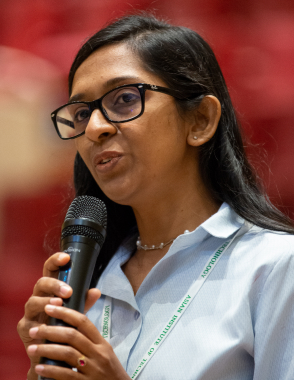Nadeesha Manamperi
“At the forefront of sustainable energy transition."
Nadeesha is one of the few women engineers in the Generation Division of the Ceylon Electricity Board, Sri Lanka.

“At the forefront of sustainable energy transition."
Nadeesha is one of the few women engineers in the Generation Division of the Ceylon Electricity Board, Sri Lanka.

A member of Toastmasters International, she is already quite experienced with presenting herself confidently and communicating her ideas to a room full of people. For Nadeesha, the biggest challenge was to juggle all her different roles while being a SAR100 participant. A mother to a young 2-year-old daughter, Nadeesha reflects on her division of time during the SAR100 training.
Nadeesha echoes the sentiments of many other participants in the SAR100 training program, where women had to learn how to balance and juggle various tasks, both within and outside of their homes, while ensuring that the quality of their assignments remain steady and their communication for group projects doesn’t drop.
As taxing as it was, Nadeesha believes that all efforts and sacrifices were worth it. She observed a significant jump in her technical knowledge, presentation and communication skills, and leadership qualities.
This training has sparked a light inside me, to create a more inclusive workplace culture for women. I hope the light grows to inspire and lead the future generation of women in the energy sector. It is just a matter of when we get the right opportunities to take this mission forward.
Nadeesha has already published a research paper along with five other Sri Lankan participants, under the guidance of Dr. Jay Govind Singh, the academic lead from the Asian Institute of Technology for the SAR100 program. The paper is titled ‘Balancing the environment and energy needs: Environmental and social impacts of hydro, solar and wind power development in Sri Lanka’. The paper has been submitted for the Conference of the Electric Power Supply Industry (CEPSI), which is scheduled to be held in Singapore in October 2025.
The paper provides insights into the environmental and social costs of creating Renewable High-Grids, highlighting the risks associated with hydro and solar projects, as well as providing solutions and regulatory suggestions to mitigate associated risks. This paper is crucial in understanding how a small island nation like Sri Lanka can balance its growing energy needs, without compromising on environmental sustainability and social safety, prosperity and justice. With the Sri Lanka Sustainable Energy Authority targeting 70% of its electricity generation through Renewables by 2030, this research project could not have been more pertinent to Sri Lanka’s energy transition journey; and professionals like Nadeesha are at the forefront of driving this change for the better.